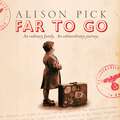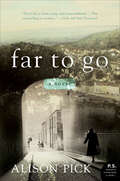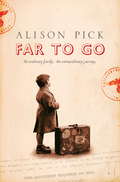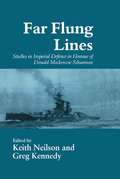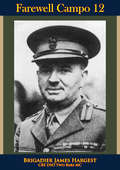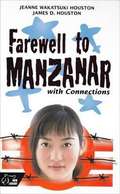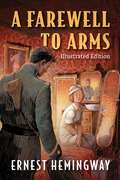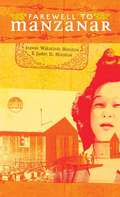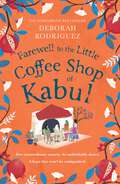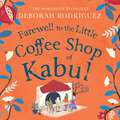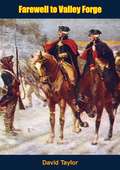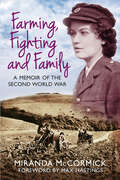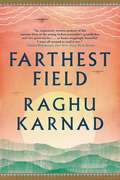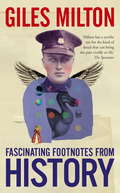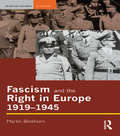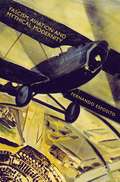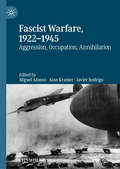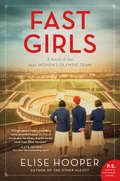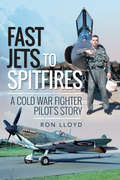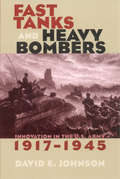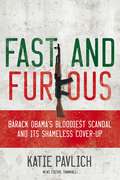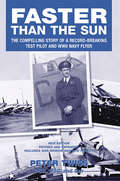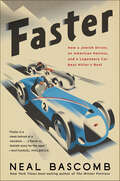- Table View
- List View
Far to Go
by Alison PickLonglisted for the 2011 MAN BOOKER PRIZE for Fiction, FAR TO GO is a powerful and profoundly moving story about one family's epic journey to flee the Nazi occupation of their homeland in 1939, and above all to save the life of a six-year-old boy. Pavel and Anneliese Bauer are affluent, secular Jews, whose lives are turned upside down by the arrival of the German forces in Czechoslovakia. Desperate to avoid deportation, the Bauers flee to Prague with their six-year-old son, Pepik, and his beloved nanny, Marta. When the family try to flee without her to Paris, Marta betrays them to her Nazi boyfriend. But it is through Marta's determination that Pepik secures a place on a Kindertransport, though he never sees his parents or Marta again. Inspired by Alison Pick's own grandparents who fled their native Czechoslovakia for Canada during the Second World War, FAR TO GO is a deeply personal and emotionally harrowing novel.
Far to Go: A Novel
by Alison PickThe Man Booker Prize finalist Far to Go by acclaimed author Alison Pick is historical fiction at its very best.When Czechoslovakia relinquishes the Sudetenland to Hitler, the powerful influence of Nazi propaganda sweeps through towns and villages like a sinister vanguard of the Reich's advancing army. A fiercely patriotic secular Jew, Pavel Bauer is helpless to prevent his world from unraveling as first his government, then his business partners, then his neighbors turn their back on his affluent, once-beloved family. Only the Bauers' adoring governess, Marta, sticks by Pavel, his wife, Anneliese, and their little son, Pepik, bound by her deep affection for her employers and friends. But when Marta learns of their impending betrayal at the hands of her lover, Ernst, Pavel's best friend, she is paralyzed by her own fear of discovery—even as the endangered family for whom she cares so deeply struggles with the most difficult decision of their lives.Interwoven with a present-day narrative that gradually reveals the fate of the Bauer family during and after the war, Far to Go is a riveting family epic, love story, and psychological drama.
Far to Go: A Novel (P. S. Ser.)
by Alison PickFor readers of THE TATTOOIST OF AUSCHWITZ and SCHINDLER'S LIST, FAR TO GO is a powerful, mesmerising novel centring on one family's heartbreaking decision to save their son - by saying goodbye to him for ever.Longlisted for the 2011 MAN BOOKER PRIZE for Fiction'Extraordinary' Daily Mail 'A potential classic in the making' Financial TimesPepik is only six when the German forces invade Czechoslovakia. Desperate to find freedom, his affluent Jewish parents try to escape with him to Paris, but are betrayed by Marta, the family's beloved nanny. Yet it is Marta who then secures a place for the Pepik on a Kindertransport, an act of determination that saves his life. But the child is never to see his parents or Marta again.'Somewhere between a book and a miracle' Catherine Ryan Hyde
Far-flung Lines: Studies in Imperial Defence in Honour of Donald Mackenzie Schurman (Cass Series: Naval Policy and History #Vol. 2)
by Keith Neilson Greg KennedyThese studies show how the British Empire used its maritime supremacy to construct and maintain a worldwide defence for its imperial interests. They rebut the idea that British defence policy in the late 19th and early 20th centuries was primarily concerned with the balance of power in Europe.
Farewell Campo 12
by Brigadier James Hargest CBE DSO Two Bars MCBrigadier James Hargest was a decorated New Zealand officer who served during World War I and II. Having fought in the bloody battles of the Invasion of Crete, he went on to lead the 5th Brigade in the Western Desert during Operation Crusader but was captured soon into the campaign. Never one to take a defeat lying down Hargest, determined to escape his Italian Prisoner of War camp "Campo 12", this journey and its adventures are recounted here in this book of his journey to Switzerland and freedom. Throwing himself back into the fray immediately he served on staff during the invasion of Normandy, but was killed by shellfire in August 1944.As one of only three men known to British Military Intelligence to have successfully escaped an Italian PoW camp, Hargest was awarded a second bar to his DSO and was later appointed a Commander of the Order of the British Empire.
Farewell To Manzanar with Connections
by James Houston Jeanne HoustonIn the year 1942, in the midst of World War II, the Wakatsuki family is forced to leave their home. They are sent to live at the internment camp in Manzanar along with thousands of other Japanese Americans. Based on the real life experiences of co-author Jeanne Wakatsuki Houston, Farewell to Manzanar covers Wakatsuki family life before the war, during their three and a half years in camp, and post war. Learn how this particular family dealt with the injustices of forced imprisonment.
Farewell to Arms: Illustrated Edition
by Ernest HemingwayNew illustrations by Tim Foley accompany this timeless classic by Ernest Hemingway First published in 1929, A Farewell to Arms has endured as one of Hemingway&’s most popular works. The novel was his first bestseller, which solidified him as a serious writer and a fixture in the American literary canon. Set against the brutal backdrop of the First World War, the novel is narrated by Lieutenant Frederic Henry, who is an American medic in the ambulance corps of the Italian Army. Frederic&’s friend, Surgeon Rinaldi, is infatuated with a lover by the name of Miss Catherine Barkley. Upon encountering Miss Barkley, Frederic is immediately taken with her and tries to kiss her, unsuccessfully. Grieving the death of her fiancé, she begins to feel an illusory attachment to Frederic while Rinaldi fades into obscurity. Soon after, Frederic is wounded in battle and taken to a hospital in Milan to heal. In addition to his physical ailments, the horrors of war also begin to take a toll on Frederic mentally, leaving him detached. Following a hasty knee surgery, he is delighted to learn that Miss Barkley has been transferred to his hospital. Despite his emotional bankruptcy, his relationship with Catherine intensifies. Still, tragedy lies ahead, and not even love can save them. This tour de force is quintessential Hemingway—bullets and shrapnel, straight to the heart. With stunning illustrations by Tim Foley (The Sun Also Rises, Clydesdale, 2022), this is sure to be the perfect addition to any Hemingway fan&’s collection.
Farewell to Manzanar: A True Story of Japanese American Experience During and After the World War II Internment
by Jeanne Wakatsuki Houston James D. HoustonA moving and intensely human true story of a Japanese American family during the internment of World War II and its aftermath
Farewell to The Little Coffee Shop of Kabul
by Deborah RodriguezTHE LONG-AWAITED SEQUEL TO THE LITTLE COFFEE SHOP OF KABUL, THE BESTSELLER THAT CAPTURED THE HEARTS OF MILLIONS WORLDWIDE Kabul, August 2021 Sunny Tedder is back in her beloved coffee shop. After eight years away, she's thrilled to reunite with her Kabul 'family': Yazmina now runs a pair of women's shelters from the old cafe, and dreams of a bright future for her two young daughters. Her sister Layla has become an outspoken women's rights activist and, thanks to social media, is quite the celebrity. Kat, Sunny's friend from America, is wrapping up her year-long stay in the land of her birth, but is facing some unfinished business. And finally there's elderly den mother Halajan, whose secret new hobby is itself an act of rebellion. Then the US troops begin to withdraw - and the women watch in horror as the Taliban advance on the capital at ferocious speed...Set against the terrifying fall of Kabul in 2021, Deborah Rodriguez concludes her bestselling Little Coffee Shop trilogy with a heart-stopping story of resilience, courage and, most importantly, hope.Praise for Deborah Rodriguez'Eye-opening and uplifting' - Grazia 'Restores belief in humanity' - Daily Telegraph 'Heart-warming' - Cosmopolitan'Beguiling' - Woman 'Captivating and addictive' - Take a Break'Full of heart and intelligence' - Look Magazine
Farewell to The Little Coffee Shop of Kabul
by Deborah RodriguezTHE LONG-AWAITED SEQUEL TO THE LITTLE COFFEE SHOP OF KABUL, THE BESTSELLER THAT CAPTURED THE HEARTS OF MILLIONS WORLDWIDE Kabul, August 2021 Sunny Tedder is back in her beloved coffee shop. After eight years away, she's thrilled to reunite with her Kabul 'family': Yazmina now runs a pair of women's shelters from the old cafe, and dreams of a bright future for her two young daughters. Her sister Layla has become an outspoken women's rights activist and, thanks to social media, is quite the celebrity. Kat, Sunny's friend from America, is wrapping up her year-long stay in the land of her birth, but is facing some unfinished business. And finally there's elderly den mother Halajan, whose secret new hobby is itself an act of rebellion. Then the US troops begin to withdraw - and the women watch in horror as the Taliban advance on the capital at ferocious speed...Set against the terrifying fall of Kabul in 2021, Deborah Rodriguez concludes her bestselling Little Coffee Shop trilogy with a heart-stopping story of resilience, courage and, most importantly, hope.Praise for Deborah Rodriguez'Eye-opening and uplifting' - Grazia 'Restores belief in humanity' - Daily Telegraph 'Heart-warming' - Cosmopolitan'Beguiling' - Woman 'Captivating and addictive' - Take a Break'Full of heart and intelligence' - Look Magazine
Farewell to Valley Forge
by David TaylorA THRILLING NOVEL OF COURAGE, LOVE AND TREACHERY DURING THE YEARS OF OUR COUNTRY’S BIRTHThe desperate year of 1778. Philadelphia is occupied by the British. Not far away in Valley Forge the ragged and courageous army of George Washington is just coming through its bitter winter stand. Meanwhile the Continental Congress is being beleaguered by a number of officers and influential people to replace Washington as Commander of the patriot armies. At the center of this cabal is General Charles Lee.In this setting of intrigue and revolutionary passion, David Taylor has woven a sanguine and stirring narrative of young Captain Jonathan Kimball of Virginia, assigned to live as a servant in the house of Enoch Ladd, an imprisoned Patriot shipowner, and to spy on the British. With him in this enterprise is the lovely and daring Elizabeth Ladd, daughter of the household and a spy herself.Mutually suspicious at first, Jonathan and Elizabeth come to trust one another after each has been through some dangerous escapades. There is the time Elizabeth overhears some vital information at a masquerade ball she attends on a stolen invitation, and the time when Jonathan helps La Fayette out of a trap set by the British.With a wonderful insight into this exciting historical period Taylor tells of the British Fleet trying to evacuate the Delaware, of the bravery of Molly Pitcher, and the almost disastrous treachery of Lee. Climaxing the whole story is a blow-by-blow description of the illustrious Battle of Monmouth.
Farming, Fighting and Family: A Memoir of the Second World War
by Max Hastings Miranda McCormickFarmer, author and broadcaster Arthur (A.G.) Street was one of the leading voices of British agriculture during the Second World War. His daughter Pamela – herself an aspiring writer – was 18 when war broke out. David, her future husband, served with the 4th RHA in North Africa. Using their previously unpublished diaries and letters, Miranda McCormick – Pamela’s daughter – tells the candid story of a Wiltshire family living and working at a time when ‘a little German with a black paint-brush moustache turned [the] world upside down’. Their very different experiences of war are woven into one masterful narrative of love, duty and separation during a time of national adversity. Detailing the sudden rise of her tenant farmer father to the status of a national celebrity, Pamela’s service as a VAD nurse and in the ATS, as well as her unofficial fiancé’s detainment in German and Italian prison camps, this is a story told with an almost allegorical simplicity. Intimate and personal, this vivid account of ‘ordinary life’ during extraordinary times is also the chronicle of a generation for whom farming was the fourth line of defence.
Farthest Field: An Indian Story of the Second World War
by Raghu KarnadA brilliantly conceived nonfiction epic, a war narrated through the lives and deaths of a single family. The photographs of three young men had stood in his grandmother's house for as long as he could remember, beheld but never fully noticed. They had all fought in the Second World War, a fact that surprised him. Indians had never figured in his idea of the war, nor the war in his idea of India. One of them, Bobby, even looked a bit like him, but Raghu Karnad had not noticed until he was the same age as they were in their photo frames. Then he learned about the Parsi boy from the sleepy south Indian coast, so eager to follow his brothers-in-law into the colonial forces and onto the front line. Manek, dashing and confident, was a pilot with India's fledgling air force; gentle Ganny became an army doctor in the arid North-West Frontier. Bobby's pursuit would carry him as far as the deserts of Iraq and the green hell of the Burma battlefront. The years 1939-45 might be the most revered, deplored, and replayed in modern history. Yet India's extraordinary role has been concealed, from itself and from the world. In riveting prose, Karnad retrieves the story of a single family--a story of love, rebellion, loyalty, and uncertainty--and with it, the greater revelation that is India's Second World War. Farthest Field narrates the lost epic of India's war, in which the largest volunteer army in history fought for the British Empire, even as its countrymen fought to be free of it. It carries us from Madras to Peshawar, Egypt to Burma--unfolding the saga of a young family amazed by their swiftly changing world and swept up in its violence.
Fascinating Footnotes From History
by Giles Milton'Giles Milton is a man who can take an event from history and make it come alive . . . an inspiration for those of us who believe that history can be exciting and entertaining' Matthew Redhead, The TimesDid you know that Hitler took cocaine? That Stalin robbed a bank? That Charlie Chaplin's corpse was filched and held to ransom? Giles Milton is a master of historical narrative: in his characteristically engaging prose, Fascinating Footnotes From History details one hundred of the quirkiest historical nuggets; eye-stretching stories that read like fiction but are one hundred per cent fact.There is Hiroo Onoda, the lone Japanese soldier still fighting the Second World War in 1974; Agatha Christie, who mysteriously disappeared for eleven days in 1926; and Werner Franz, a cabin boy on the Hindenburg who lived to tell the tale when it was engulfed in flames in 1937. Fascinating Footnotes From History also answers who ate the last dodo, who really killed Rasputin and why Sergeant Stubby had four legs. Peopled with a gallery of spies, rogues, cannibals, adventurers and slaves, and spanning twenty centuries and six continents, Giles Milton's impeccably researched footnotes shed light on some of the most infamous stories and most flamboyant and colourful characters (and animals) from history.(Previoulsy published in four individual epub volumes: When Hitler Took Cocaine, When Stalin Robbed a Bank, When Lenin Lost His Brain and When Churchill Slaughtered Sheep.)
Fascinating Footnotes From History: Fascinating Footnotes from History
by Giles Milton'Giles Milton is a man who can take an event from history and make it come alive . . . an inspiration for those of us who believe that history can be exciting and entertaining' Matthew Redhead, The TimesDid you know that Hitler took cocaine? That Stalin robbed a bank? That Charlie Chaplin's corpse was filched and held to ransom? Giles Milton is a master of historical narrative: in his characteristically engaging prose, Fascinating Footnotes From History details one hundred of the quirkiest historical nuggets; eye-stretching stories that read like fiction but are one hundred per cent fact.There is Hiroo Onoda, the lone Japanese soldier still fighting the Second World War in 1974; Agatha Christie, who mysteriously disappeared for eleven days in 1926; and Werner Franz, a cabin boy on the Hindenburg who lived to tell the tale when it was engulfed in flames in 1937. Fascinating Footnotes From History also answers who ate the last dodo, who really killed Rasputin and why Sergeant Stubby had four legs. Peopled with a gallery of spies, rogues, cannibals, adventurers and slaves, and spanning twenty centuries and six continents, Giles Milton's impeccably researched footnotes shed light on some of the most infamous stories and most flamboyant and colourful characters (and animals) from history.(Previoulsy published in four individual epub volumes: When Hitler Took Cocaine, When Stalin Robbed a Bank, When Lenin Lost His Brain and When Churchill Slaughtered Sheep.)
Fascism and the Right in Europe 1919-1945 (Seminar Studies)
by Martin BlinkhornThis new text places interwar European fascism squarely in its historical context and analyses its relationship with other right wing, authoritarian movements and regimes. Beginning with the ideological roots of fascism in pre-1914 Europe, Martin Blinkhorn turns to the problem-torn Europe of 1919 to 1939 in order to explain why fascism emerged and why, in some settings, it flourished while in others it did not. In doing so he considers not just the 'major' fascist movements and regimes of Italy and Germany but the entire range of fascist and authoritarian ideas, movements and regimes present in the Europe of 1919-1945.
Fascism, Aviation and Mythical Modernity
by Fernando EspositoFlying and the pilot were significant metaphors of fascism's mythical modernity. Fernando Esposito traces the changing meanings of these highly charged symbols from the air show in Brescia, to the sky above the trenches of the First World War to the violent ideological clashes of the interwar period.
Fascist Warfare, 1922–1945: Aggression, Occupation, Annihilation
by Alan Kramer Javier Rodrigo Miguel AlonsoThis groundbreaking book explores the interpretative potential and analytical capacity of the concept ‘fascist warfare’. Was there a specific type of war waged by fascist states? The concept encompasses not only the practice of violence at the front, but also war culture, the relationship between war and the fascist project, and the construction of the national community. Starting with the legacy of the First World War and using a transnational approach, this collection presents case studies of fascist regimes at war, spanning Nazi Germany, Fascist Italy, Francoist Spain, Croatia, and Imperial Japan. Themes include the idea of rapid warfare as a symbol of fascism, total war, the role of modern technology, the transfer of war cultures between regimes, anti-partisan warfare as a key feature, and the contingent nature and limits of fascist warfare.
Fast Girls: A Novel of the 1936 Women's Olympic Team
by Elise Hooper“Fast Girls is a compelling, thrilling look at what it takes to be a female Olympian in pre-war America...Brava to Elise Hooper for bringing these inspiring heroines to the wide audience they so richly deserve.”—Tara Conklin, New York Times bestselling author of The Last Romantics and The House Girl Acclaimed author Elise Hooper explores the gripping, real life history of female athletes, members of the first integrated women’s Olympic team, and their journeys to the 1936 summer games in Berlin, Nazi Germany. Perfect for readers who love untold stories of amazing women, such as The Only Woman in the Room, Hidden Figures, and The Lost Girls of Paris. In the 1928 Olympics, Chicago’s Betty Robinson competes as a member of the first-ever women’s delegation in track and field. Destined for further glory, she returns home feted as America’s Golden Girl until a nearly-fatal airplane crash threatens to end everything. Outside of Boston, Louise Stokes, one of the few black girls in her town, sees competing as an opportunity to overcome the limitations placed on her. Eager to prove that she has what it takes to be a champion, she risks everything to join the Olympic team. From Missouri, Helen Stephens, awkward, tomboyish, and poor, is considered an outcast by her schoolmates, but she dreams of escaping the hardships of her farm life through athletic success. Her aspirations appear impossible until a chance encounter changes her life. These three athletes will join with others to defy society’s expectations of what women can achieve. As tensions bring the United States and Europe closer and closer to the brink of war, Betty, Louise, and Helen must fight for the chance to compete as the fastest women in the world amidst the pomp and pageantry of the Nazi-sponsored 1936 Olympics in Berlin.
Fast Jets to Spitfires: A Cold War Fighter Pilot's Story
by Ron LloydA memoir of RAF service in the postwar era and the golden age of British military aviation, including photos.How often have you glanced skyward at the sound of a passing aircraft and wondered what it would be like to fly one of those gleaming metal machines? Or admired the skill and daring of the fighter pilot swooping down upon his enemy in the awe-inspiring, unrivaled elegance of a Spitfire? Ron Lloyd has had the experience of flying the majestic propeller-driven aircraft of the Second World War as well as the roaring, sound-barrier-breaking jets of the Cold War—and in this exciting book, he places the reader in the cockpit, describing what it really feels like to be sitting at the controls of a fighter aircraft.Lloyd joined the RAF after World War II, and during his early service he was selected as one of the pilots to fly the wartime aircraft in the feature film The Battle of Britain, giving him the opportunity to fly a Spitfire and even a Messerschmitt Bf 109 during the six weeks of filming. His role with the RAF, on the other hand, saw him on the front line in the Cold War, piloting de Havilland Vampires, Hawker Hunters, Gloster Javelins, Lightnings, and Phantoms. He also served on exchange in the USA where he flew Convair F-102s, Convair F-106s, and Lockheed T-33s.Packed with unique photographs of the golden age of British military aviation, Fast Jets to Spitfires allows readers to experience, through Ron Lloyd’s graphic accounts, the pure joy of being airborne.
Fast Tanks and Heavy Bombers: Innovation in the U.S. Army, 1917–1945 (Cornell Studies in Security Affairs)
by David E. JohnsonThe U. S. Army entered World War II unprepared. In addition, lacking Germany's blitzkrieg approach of coordinated armor and air power, the army was organized to fight two wars: one on the ground and one in the air. Previous commentators have blamed Congressional funding and public apathy for the army's unprepared state. David E. Johnson believes instead that the principal causes were internal: army culture and bureaucracy, and their combined impact on the development of weapons and doctrine. Johnson examines the U. S. Army's innovations for both armor and aviation between the world wars, arguing that the tank became a captive of the conservative infantry and cavalry branches, while the airplane's development was channeled by air power insurgents bent on creating an independent air force. He maintains that as a consequence, the tank's potential was hindered by the traditional arms, while air power advocates focused mainly on proving the decisiveness of strategic bombing, neglecting the mission of tactical support for ground troops. Minimal interaction between ground and air officers resulted in insufficient cooperation between armored forces and air forces. Fast Tanks and Heavy Bombers makes a major contribution to a new understanding of both the creation of the modern U. S. Army and the Army's performance in World War II. The book also provides important insights for future military innovation.
Fast and Furious
by Trista Ann MichaelsFast cars, fast men, and a fast life have finally landed Allie in more trouble than she can handle. Escaping the grasp of a Russian drug cartel isn't going to be easy, even with the help of the three well-muscled Navy Seals her father sent to save her.Allie likes things fast--cars, men, as well as every aspect of her life. She lives for the moment, which is probably how she found herself waist deep in the middle of a Russian drug cartel. As an undercover cop, she thought she had things well in hand. She was wrong.Three Navy Seals are sent in by Allie's father, SECNAV, to assess the situation. There's concern Allie's in serious danger, and her father wants her out; preferably in one piece. Chase, Logan, and Blaine are all attracted to her, but she will become much more to one of them.Unfortunately for Allie, witness relocation isn't an option. The Russians can always find them. For Allie to get out, she'll have to bring them down.Multiple partners, anal sex, non sexual violence.
Fast and Furious: Barack Obama's Bloodiest Scandal and Its Shameless Cover-up
by Katie PavlichA BLOODY SCANDAL AND ITS SHAMELESS COVER-UP. No scandal is more threatening to the Obama administration than Operation Fast and Furious. While other scandals involve money, Fast and Furious involves lives, including that of Border Patrol Agent Brian Terry, gunned down with a weapon that the federal government put in the hands of Mexico's narco-terrorists. As shocking as Operation Fast and Furious was--and this book explains, in chilling detail, just what this operation conducted by the ATF, under the supervision of the Justice Department, entailed--equally appalling is the blatant cover-up of wrongdoing by the Obama administration. No reporter has been more dogged in tracking down the facts about Fast and Furious than Katie Pavlich. In her stunning new book she reveals: » The documents that undermine the White House's claims of ignorance about Fast and Furious "How Eric Holder, President Obama's attorney general, has, under oath, repeatedly changed his testimony » The still mounting death toll from Fast and Furious "The retaliation against Fast and Furious whistleblowers "Why Homeland Security Secretary Janet Napolitano might be charged with perjury » The Obama administration's continuing assault on Second Amendment rights » Why Fast and Furious could be a bigger scandal than Watergate Unraveling the mystery of what Fast and Furious was all about, Katie Pavlich delivers a stunning indictment of a radical administration willing to trample the Constitution and risk lives to achieve its ideological goals.
Faster Than The Sun: The Compelling Story of a Record-Breaking Test Pilot and WWII Navy Flyer
by Peter TwissThe autobiography of the Fairey Aviation test pilot and Naval fighter pilot who broke the World Air Speed Record in 1956. This autobiography of Peter Twiss, the man who flew 1000mph for the first time in history, tells the story of the record-breaking Fairey Delta. It describes the vast organization necessary for the record bid, the political lobbying, and the almost intolerable tension when the flights failed.Faster Than the Sun is also a compelling account of Twiss&’s wartime experiences as a Fleet Air Arm pilot who saw action in Fulmars over the convoys to Malta, in Seafires during the Operation Torch landings in Africa, and as a night fighter flying Mosquitoes. It is an epic account of daring, determination, and dedication—straight from the cockpit.
Faster: How a Jewish Driver, an American Heiress, and a Legendary Car Beat Hitler's Best
by Neal BascombThe New York Times bestselling author thrillingly recounts how an underdog driving team beat Hitler’s fearsome Silver Arrows in the 1938 Pau Grand Prix. They were the unlikeliest of heroes. Rene Dreyfus, a former top driver on the international racecar circuit, had been banned from the best European teams—and fastest cars—by the mid-1930s because of his Jewish heritage. Charles Weiffenbach, head of the down-on-its-luck automaker Delahaye, was desperately trying to save his company. And Lucy Schell, the adventurous daughter of an American multi-millionaire, yearned to reclaim the glory of her rally-driving days. As Nazi Germany pushed the world toward war, these three misfits banded together to challenge Hitler’s dominance at the apex of motorsport: the Grand Prix. Their quest for redemption culminated in a remarkable race that is still talked about in racing circles to this day—but which, soon after it ended, Hitler attempted to completely erase from history. Bringing to life the Golden Era of Grand Prix racing, Faster chronicles one of the most inspiring, death-defying upsets of all time: a symbolic blow against the Nazis during history’s darkest hour.Winner of the Motor Press Guild Best Book of the Year Award & Dean Batchelor Award for Excellence in Automotive Journalism
